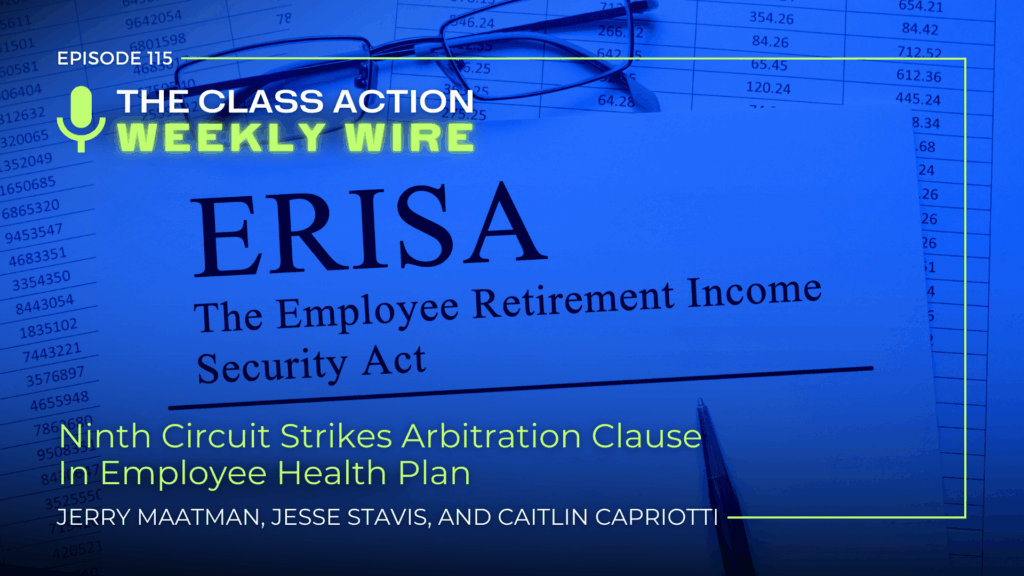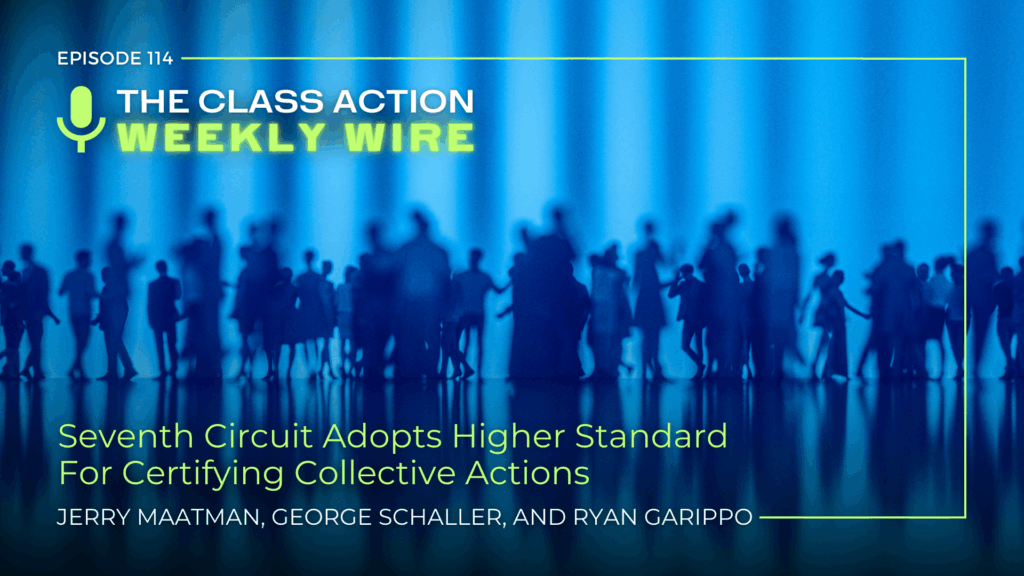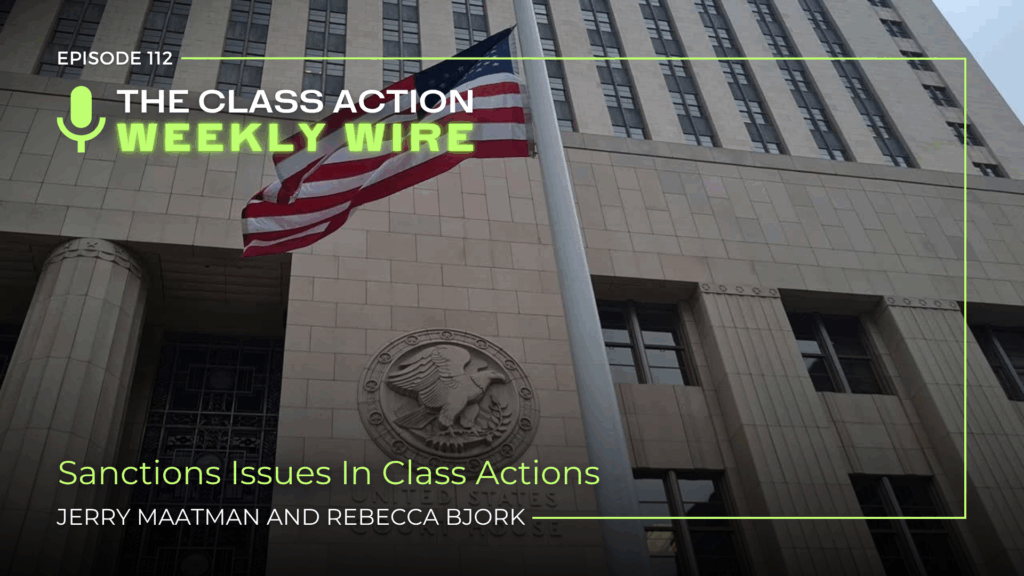
Duane Morris Takeaway: This week’s episode of the Class Action Weekly Wire features Duane Morris partner Jerry Maatman and associates Jesse Stavis and Caitlin Capriotti with their discussion of a major Ninth Circuit decision addressing a district court’s denial of a motion to compel arbitration in a proposed ERISA class action.
Check out today’s episode and subscribe to our show from your preferred podcast platform: Spotify, Amazon Music, Apple Podcasts, Samsung Podcasts, Podcast Index, Tune In, Listen Notes, iHeartRadio, Deezer, and YouTube.
Episode Transcript
Jerry Maatman: Thank you to our listeners for being here again for our next episode of the Class Action Weekly Wire, our podcast series that examines class action issues. I’m Jerry Maatman, a partner at Duane Morris, and today we have Jesse Stavis of our Philadelphia office and from California, our newest team member, Caitlin Capriotti. Thank you both for being here to join the podcast.
Jesse Stavis: Great to be here, Jerry. Thanks so much for having me on again.
Caitlin Capriotti: Thanks, Jerry. I’m really happy to be here for my first episode.
Jerry: So, the Ninth Circuit just issued a very significant opinion involving Sodexo and its employee health care plan, and specifically how arbitration clauses interact with ERISA class action claims. Caitlin, can you give our listeners a synopsis of the decision?
Caitlin: Yeah, of course. So, the plaintiff in this case, Robert Platt, alleged that a monthly tobacco surcharge imposed on his employee health insurance premiums violated the ERISA. The plaintiff brought claims on behalf of himself and other plan participants under ERISA Sections 502(a)(1)(B) and 502(a)(3) and a fiduciary breach claim under 502(a)(2) on behalf of the health plan itself. Sodexo sought to compel arbitration based on the provision it unilaterally added to the Plan after Platt had already enrolled. The district court denied the motion, holding that there was no enforceable arbitration agreement because Sodexo could not unilaterally modify the Plan to impose arbitration without Platt’s consent, and then the company had appealed to the Ninth Circuit.
Jerry: Thanks for that cogent summary. Jesse, how did the Ninth Circuit react after reviewing the district court’s opinion?
Jesse: The Ninth Circuit agreed. It held that an employer cannot create a valid arbitration agreement simply by unilaterally amending an ERISA-governed plan. Instead, valid consent from the appropriate party is required. Now, for Platt’s individual claims under Sections 502(a)(1)(B) and (a)(3), the Ninth Circuit found that Platt himself was the relevant consenting party – and that he had not consented to arbitration, so he received insufficient notice, and was never informed that continued participation would signal his agreement.
However, the Ninth Circuit held that for the fiduciary breach claim under Section 502(a)(2), the Plan, and not Platt, was the relevant consenting party. Because the Plan’s terms grant Sodexo broad authority to amend its provisions, the court found that the Plan consented to arbitration. Nonetheless, the panel also agreed with Platt’s argument that even if the Plan had consented, the arbitration clause’s ban on representative actions violated the effective vindication doctrine, which protects statutory rights from being waived through arbitration. Since representative actions are integral to ERISA enforcement under Sections 502(a)(2) and 409(a), the court held that the representative action waiver was unenforceable.
Jerry: So, what’s the essential big takeaway here? Is this just another quirky, fact-specific Ninth Circuit opinion, or are we starting to see a trend in ERISA class actions where arbitration clauses are at issue?
Caitlin: We’re definitely starting to see a trend. This decision aligns with what we’ve seen from several other circuits, specifically the Second, Third, Sixth, Seventh, and Tenth. Courts are increasingly skeptical of arbitration provisions in ERISA plans that try to block representative or class-wide claims.
Jesse: And if we take a step back and look at the big picture, we really see that employers are losing ground in trying to force individualized arbitration when plan-wide relief is at stake. That’s a pretty huge shift in ERISA litigation strategy, and employers need to take note.
Jerry: Let’s unpack this a little more. Obviously, the case is now going back down to the district court because the Ninth Circuit affirmed in part and reversed in part. What exactly got compelled to arbitration or stayed, and what got tossed?
Jesse: So, the Ninth Circuit said that Sodexo could not compel individual arbitration for benefits and equitable relief because they didn’t get proper consent from plan participants when they added the arbitration clause unilaterally. That part stuck.
Caitlin: But for the fiduciary breach claim, the court actually said Sodexo did get valid consent – from the Plan itself, which is a distinct legal entity. So, technically, that claim could be arbitrated.
Jerry: But that being said, the way I read the Ninth Circuit’s opinion, there seems to be a catch. What’s that all about?
Jesse: Yes, Jerry, there is indeed a catch. Because the arbitration clause had a representative action waiver, the court said enforcing that would violate the effective vindication doctrine. That means Platt couldn’t be blocked from pursuing a fiduciary breach claim on a representative basis, which is exactly what ERISA allows.
Jerry: Well, this is probably music to the plaintiffs’ bar, because their business model is to find a case, file the case, certify the case, and then monetize the case – and avoid being compelled to arbitration. Are the plaintiffs’ attorneys going to have a broader array of tools to try and frustrate motions to compel arbitration and keep their cases in court?
Jesse: Oh, yes, they certainly are. And beyond that, the court also opened the door for unconscionability defenses, even though Sodexo had a valid agreement with the Plan. The Ninth Circuit said those defenses arise under federal law, not state law, which means they’re not preempted by ERISA. So, Platt gets another shot at challenging the clause.
Jerry: So, is this settled law in your opinion, or are we seeing a little bit of the Wild, Wild West and a lot of innovative, creative attacks on arbitration clauses in the coming months?
Caitlin: It’s still a bit of the Wild West. While the circuits are mostly moving in the same direction, there are differences on questions like plan-wide monetary relief versus equitable relief, and how far effective vindication goes.
Jerry: My sense is this lack of clarity, or that the legal principles are in flux, may well put this on the Supreme Court’s radar, especially as more circuit splits emerge on the arbitration issue in ERISA class actions. Before we wrap up, what are your big takeaways from the Ninth Circuit’s opinion in Sodexo?
Caitlin: For me, it’s the reaffirmation that ERISA’s representative structure matters. Courts won’t let arbitration clauses rewrite that.
Jesse: And I’d just add to that by saying that employers need to be very careful with how they draft arbitration clauses in ERISA plans. Unilateral amendments and representative waivers are definitely more risky territory.
Jerry: Well said. That’s cogent advice. We’ll be watching to see if the Supreme Court of the United States takes this up, but for now, loyal blog readers and listeners, be sure to keep checking the Duane Morris Class Action Blog for our updates on all things class actions and arbitration issues. Well, thanks for being here, Jesse and Caitlin, and thanks for tuning in, listeners.
Jesse: Thanks so much for having me on the podcast, Jerry, and thanks, as always, to the listeners for being here.
Caitlin: Thanks, everyone, and thank you for the warm welcome. I’m happy to be here.









